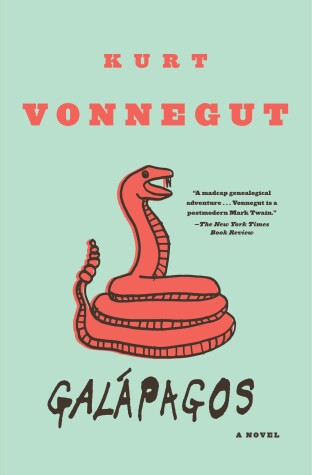I hadn’t read Kurt Vonnegut when he died in 2007, but I remember the day. I was working in Maryland at a company that was falling to shit, and the programmers, the guys going down with the ship, spent most of their days goofing around on bets and dares. That morning, they were assembled in front of the whiteboard, an eraser-swiped hole through the Perl command-line arguments. “RIP, V” someone had scrawled. I joked, “who died?” and it thudded across the room. They raised paper cups of whiskey and read a line that must have been from Slaughterhouse-Five, one of the lines that ends in “So it goes.” That was the day one of the guys laughed at me in the breakroom, when I said I had never read a word Kurt Vonnegut wrote.
Never again. And so it goes.
In Galápagos, when the world has ended a million years ago and our tour guide is a ghost, Vonnegut ties in all the strings to our biological lifeboat with his scathing intellect and dark black absurdities. “Lest anyone be moved to tears,” goes the chapter of the dog’s untimely death at the hands of six Kanka-bono girls, “Oh well— she wasn’t going to write Beethoven’s Ninth Symphony anyway.”
“I asked him if the black joke was original, and he said no, that he had heard it from his German grandfather, who had been an officer in charge of burying the dead on the Western Front during World War One. It was common for soldiers new to that sort of work to wax philosophical over this corpse or that one, into whose face he was about to shovel dirt, speculating about what he might have done if he hadn’t died so young. There were many cynical things a veteran might say to such a thoughtful recruit, and one of those was: ‘Don’t worry about it. He wasn’t going to write Beethoven’s Ninth Symphony anyway.’”
It’s something I like to think about, how the world won’t end when we end. More or less this small blue rock will go on spinning around the sun, outlasting us for at least a few million years. It’s kind of lovely picture, really. One of the few things it will be the poorer for, we can say with almost certainty, is not having Kurt Vonnegut there to say, “The thing was.”
